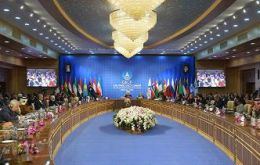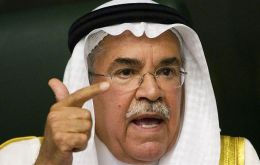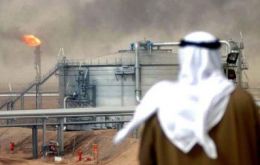MercoPress. South Atlantic News Agency
Tag: Organization of the Petroleum Exporting Countries OPEC
-
Saturday, June 4th 2016 - 09:29 UTC
OPEC summit fails to agree on a clear oil policy output strategy

The Organization of the Petroleum Exporting Countries failed to agree on a clear oil-output strategy on Thursday as Iran insisted on steeply raising its production, though archrival Saudi Arabia promised not to flood the market and sought to mend fences within the organization.
-
Monday, April 18th 2016 - 08:40 UTC
Leading oil exporters can't agree to cap production; Iran did not attend

The meeting of the world's leading oil exporters to discuss capping production has ended without agreement. After hours of talks in Qatar, the country's energy minister Mohammed bin Saleh al-Sada said that the oil producers needed “more time”.
-
Wednesday, February 17th 2016 - 11:04 UTC
Main oil exporters agree to freeze production, ...if all leading producers join

Four of the world's biggest oil-producing nations moved to freeze their production on Tuesday to try to halt the 70 percent drop in the price of crude because of a glut of oil on world markets. The agreement was reached by the oil ministers of Russia and three members of the Organization of the Petroleum Exporting Countries, Saudi Arabia, Venezuela and Qatar, during a closed-door meeting in Doha, the Qatar capital.
-
Friday, January 22nd 2016 - 07:21 UTC
Ecuador disenchanted with OPEC policy will work as if the cartel 'did not exist'

Ecuador President Rafael Correa said that his government was “tired” of pushing OPEC to decrease output and that the nation would keep working as if the oil cartel “did not exist.”
-
Saturday, December 12th 2015 - 07:03 UTC
US crude futures trade at $35, lowest since February 2009; in one week price dropped 10%

United States crude futures fell sharply on Friday plunging below $36 a barrel for the first time in more than seven years, after a bearish report from the International Energy Agency projected that global energy markets will remain vastly oversupplied for at least the immediate near future.
-
Saturday, December 5th 2015 - 06:50 UTC
Oil futures fall sharply after OPEC agrees to keep 'current actual production'

Oil futures fell sharply Friday, with the U.S. benchmark settling below $40 a barrel after the Organization of the Petroleum Exporting Countries agreed to keep pumping crude at current production levels despite a global glut.
-
Thursday, October 22nd 2015 - 06:51 UTC
Venezuela's proposal to cut oil production and up prices receives little echo

Russia and Mexico – non-OPEC countries, which have been invited to participate Venezuela-proposed meeting this week – have no intention to cut oil production, International Oil Daily reported.
-
Wednesday, October 21st 2015 - 06:35 UTC
Venezuela presents 2016 budget based on a US$40 per barrel estimate

Venezuela's proposed 2016 government budget is based on an estimate of $40 per barrel for the OPEC nation's oil exports, Finance Minister Rodolfo Marco said in a presentation to congress on Tuesday.
-
Wednesday, September 16th 2015 - 09:18 UTC
OPEC refuses to cut output pushing higher-cost oil producers out of the market

The monthly report from the Organization of the Petroleum Exporting Countries said a weaker outlook for China would contribute to slower global oil demand growth next year. “U.S. oil production has shown signs of slowing,” OPEC said in the report. “This could contribute to a reduction in the imbalance of oil market fundamentals, however, it remains to be seen to what extent this can be achieved in the months to come.”
